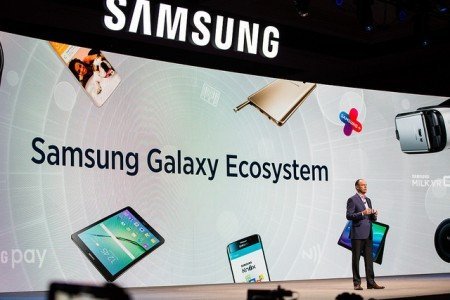This year’s CES trade show attracted thousands of producers, with IoT developers taking center stage during the event.
CES, one of the globe’s major consumer electronics trade shows, took place in Las Vegas last week. The expos brought together thousands of exhibitors, who displayed a slew of innovative gadgets and technologies. Among the many products presented during the show, the Internet of Things (IoT) devices definitely caught the most attention.
IoT is no doubt one of the hottest topics in the tech industry now. According to the research company IDC, the world IoT market will reach $1.7 trillion by 2020, driven by the growing use of connected devices.
One of the key announcements made during the show is the partnership between Microsoft and Samsung. The IT giant plans to integrate its Windows 10 operating system with Samsung’s IoT devices, including TVs, washing machines and refrigerators.
Bryan Roper, Executive Demo Lead at Microsoft, explained how Windows 10 will help users to obtain information about their homes using Cortana. Roper asked Cortana several questions, including how often members of the family use certain devices.
The system can tell its users how much time was left before the wash load or whether somebody is using the washing machine. The assistant answers with an audio message and shows a graph displaying the machine’s load capacity utilized by each family member.
Only a month ago, Microsoft unveiled its new Windows 10 IoT Core Pro SKU for device producers, what demonstrates the company’s commitment to the IoT.
In the meantime, Qualcomm, the globe’s major producer of mobile chips, introduced a new Snapdragon 820A chip for smart vehicles. The processor will allow cars to exchange data, process information in real time and detect other objects. Moreover, the Snapdragon 820A supports Wi-Fi and Bluetooth connection and can stream video and audio from multiple devices. The company’s Snapdragon 602A chips have already been used in 2017 Audi vehicles.
Qualcomm also showcased its Smart Home Reference Platform based on the Snapdragon 212 processor developed for low-power devices. The platform supports voice recognition and connectivity. Alongside, the company showed a demo for a commercial drone powered by its Snapdragon Flight platform, which could significantly reduce manufacturing costs.
Although Amazon didn’t officially participate in the expos, its products have been widely presented during the show, as multiple device producers are working on integrating Amazon’s services. The company’s voice-recognition platform, called Alexa, is especially popular among manufacturers.
Thus, Ford announced that it was going to incorporate Alexa into its SYNC platform. The system will allow drivers, for instance, to turn off lights inside the house from the automobile or start the vehicle from the house.
Meanwhile, Whirlpool displayed integration with Amazon’s Dash Replenishment Service that let users to order items like detergent just pressing a button.
CES also featured a wide range of other exhibitors. The Wi-Fi Alliance introduced its low-power and low-range Wi-Fi for the IoT appliances; Samsung showcased a Family Hub Refrigerator equipped with a Full HD monitor; Netatmo displayed an Internet-connected outdoor security camera.
next